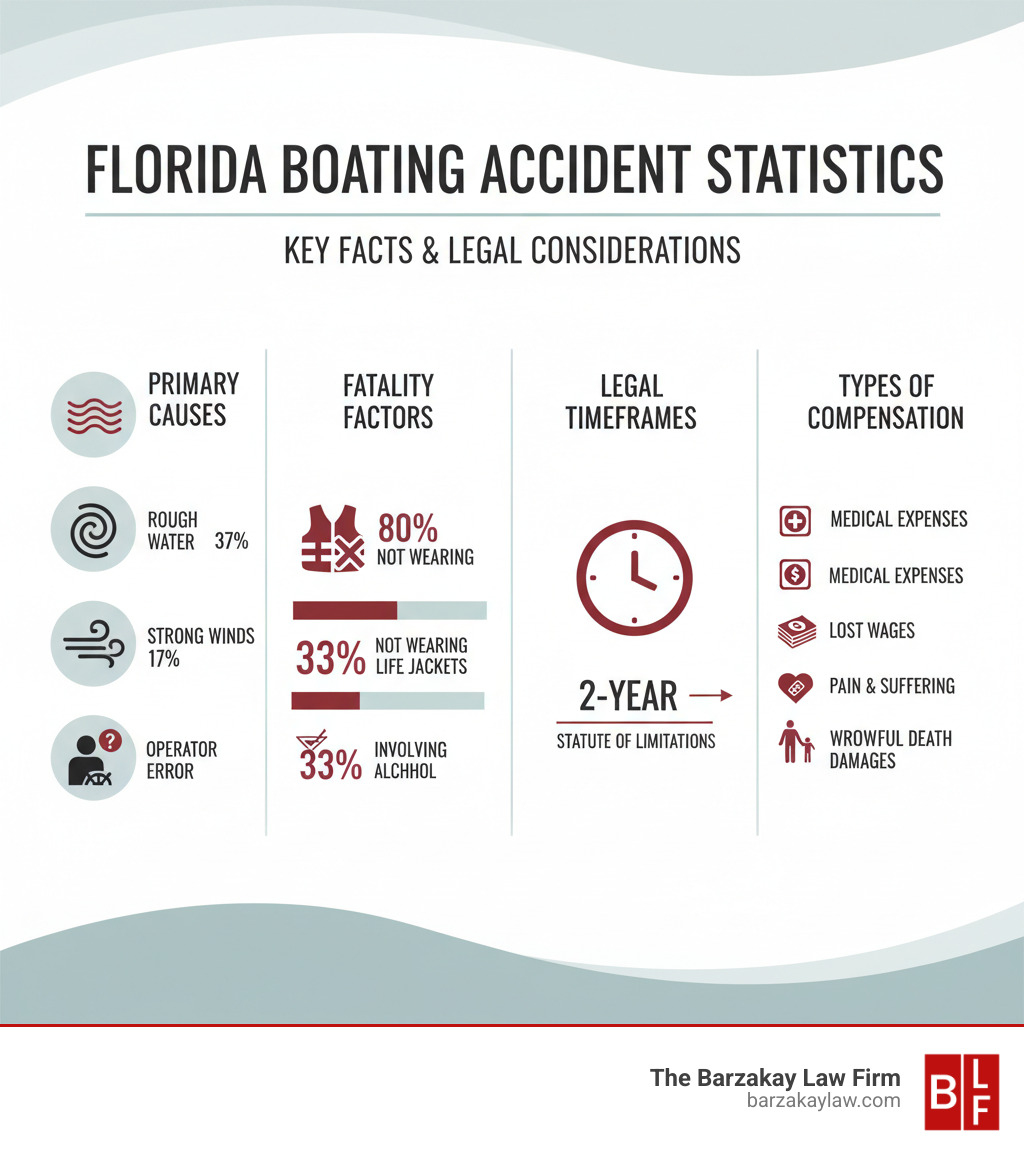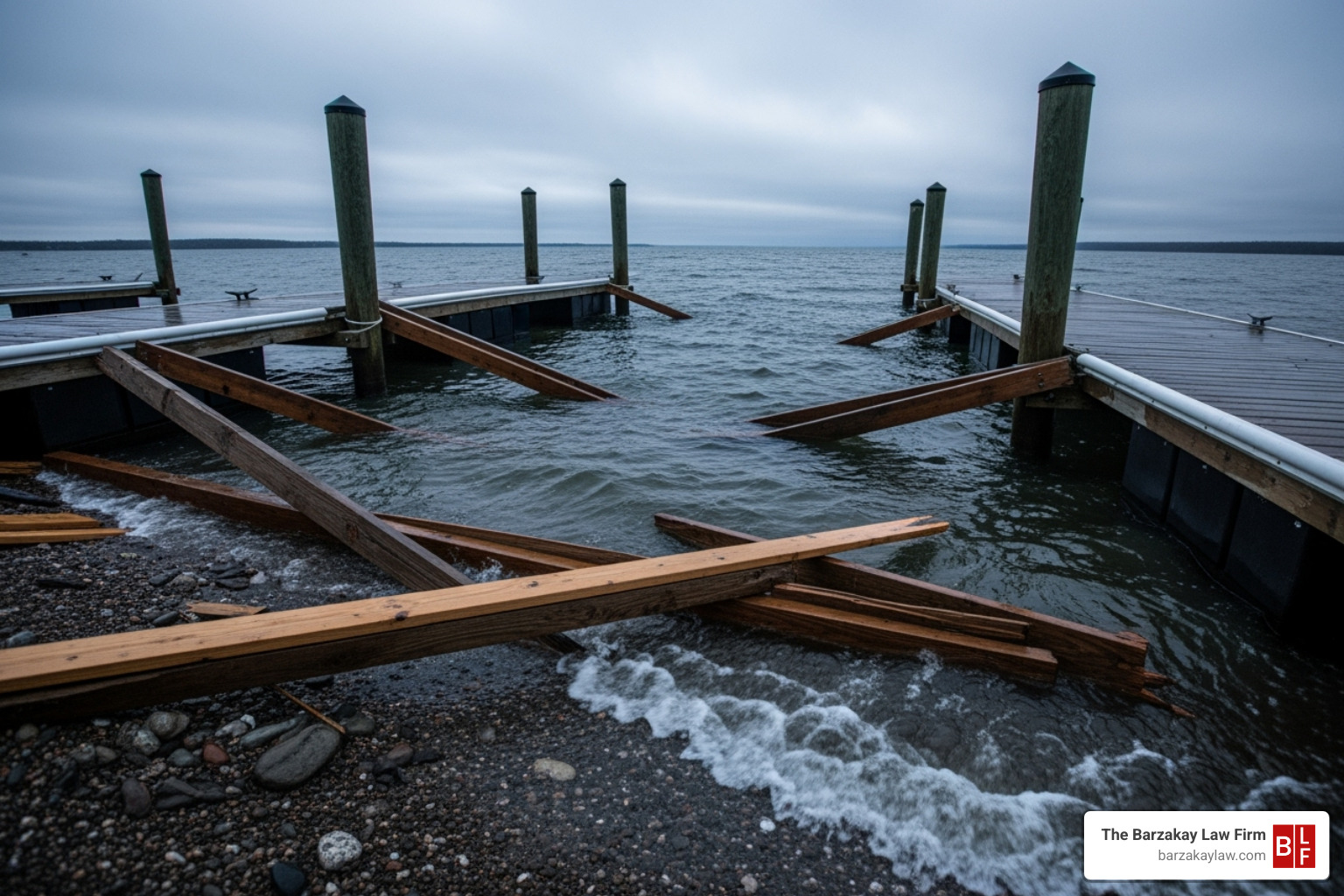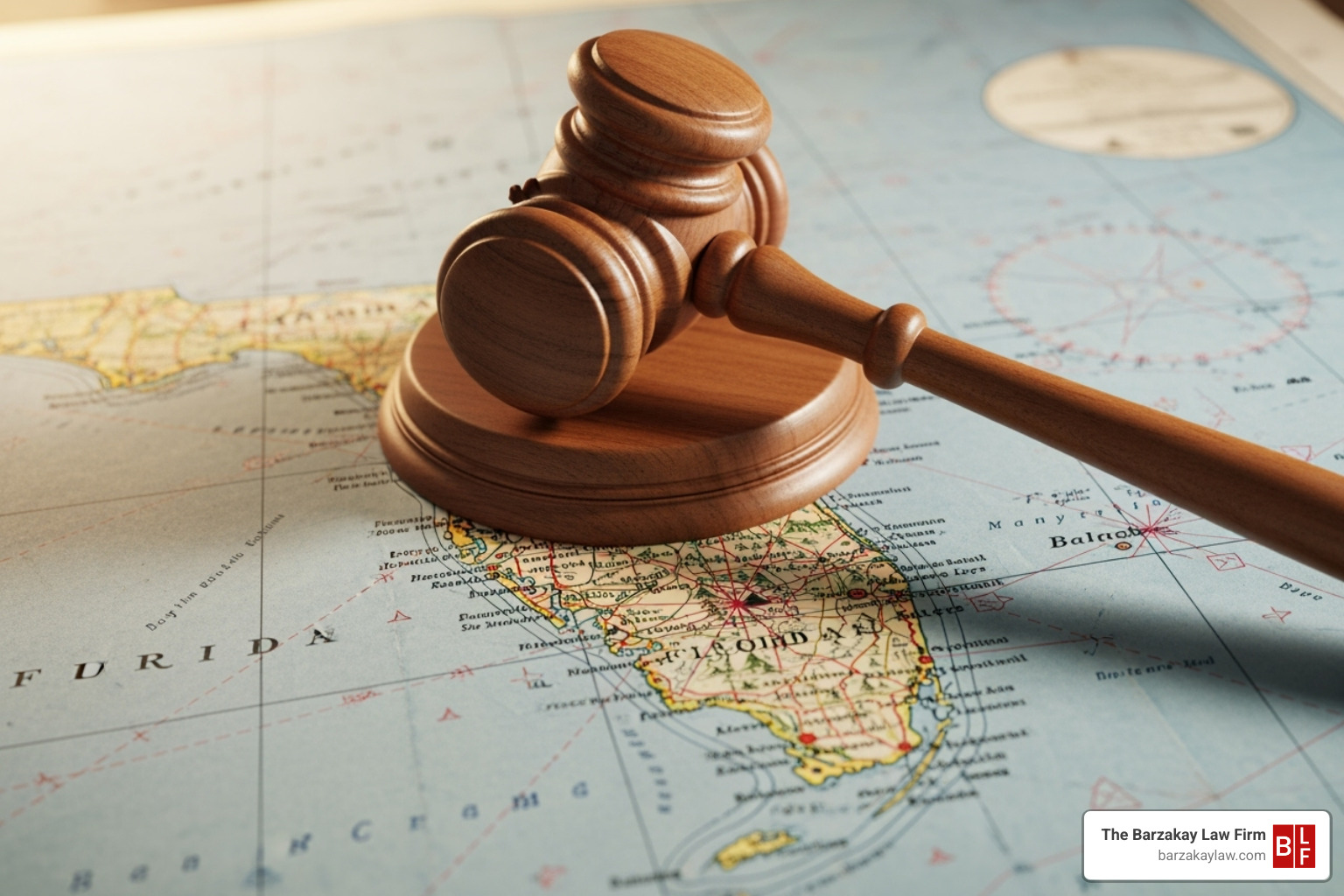Why Understanding Boating Accident Lawsuits Matters in Florida
A boating accident lawsuit can help you recover compensation for injuries and other losses caused by someone else’s negligence on the water. These lawsuits follow specific maritime and state laws, with a two-year statute of limitations in Florida.
Key aspects of boating accident lawsuits:
- Who can be sued: Boat operators, owners, rental companies, manufacturers, or marina operators
- Types of compensation: Medical expenses, lost wages, pain and suffering, property damage
- Time limit: Two years from the accident date in Florida
- Proof required: Evidence of negligence, causation, and damages
- Common causes: Operator error, alcohol impairment, equipment failure, reckless operation
Florida’s waters attract millions of boaters. From the Intracoastal Waterway in Hollywood to the Atlantic off Miami and Boca Raton, boating is a beloved pastime. But when accidents happen, the results can be devastating.
The statistics are sobering: rough water contributes to 37% of accidents, and strong winds another 17%. More troubling, in four out of five boating fatalities, the victim wasn’t wearing a life jacket, and alcohol is a factor in over a third of fatal accidents.
Unlike car accidents, boating accidents don’t have Florida’s no-fault insurance benefits. Injured victims must file lawsuits against at-fault parties. The legal landscape is complex, involving both maritime and state law.
For families facing serious injuries or loss, understanding your legal rights is the first step toward justice.
Navigating the Immediate Aftermath: First Steps After a Boating Accident
A boating accident can happen in an instant. The actions you take in the first moments are critical for everyone’s safety and for protecting your legal rights.
Prioritizing Safety and Seeking Help
First, ensure everyone is safe. Check for injuries on all vessels involved and provide first aid if you are able. Next, call for help using a marine radio (VHF Channel 16)), cell phone, flares, or an air horn. The U.S. Coast Guard and Florida Fish and Wildlife Conservation Commission (FWC) are the primary responders on Florida waters. If the vessel is unsafe, move everyone to safety immediately.
Reporting Requirements and Gathering Evidence
Once everyone is safe, you must address reporting requirements. Florida law requires you to report a boating accident if there is property damage over $2,000, an injury requiring more than first aid, a death, or a disappearance. When in doubt, report it to the FWC or local law enforcement.
Gathering evidence is crucial for a potential boating accident lawsuit. Take photos and videos of boat damage, injuries, and weather conditions. Get contact information from witnesses and exchange insurance details with other operators. Stick to the facts and avoid admitting fault.
Seeking Medical Care and Documentation
Seek medical care immediately, even if you feel fine. Adrenaline can mask serious injuries like concussions or internal trauma. Documenting your injuries creates a medical record linking them to the accident, which is vital for a lawsuit. Keep track of all appointments, treatments, and diagnoses.
Critical steps to take immediately after a boating accident:
- Ensure everyone’s safety and administer first aid.
- Signal for help using a radio, phone, or emergency signals.
- Report the accident to authorities as required by law.
- Take photos and videos of the scene, damage, and injuries.
- Collect witness contact information.
- Exchange information with other boat operators.
- Seek medical attention, even for seemingly minor injuries.
- Document everything related to the accident and your injuries.
What are the legal responsibilities of boat owners and operators?
Boat operators and owners have specific legal duties. Operators must follow navigation rules, maintain a safe speed, and keep a proper lookout. Owners are responsible for proper maintenance and ensuring all required safety equipment (life jackets, fire extinguishers, etc.) is on board and functional. Neglecting these duties can lead to liability. For more detailed guidance, see our resource on what to do after a boat injury.
What are the potential consequences for operating a boat while impaired?
Operating a boat while impaired (Boating Under the Influence – BUI) has severe consequences. Florida’s BAC limit is 0.08% for recreational boaters. Criminal penalties include fines, imprisonment, and loss of boating privileges.
Civil liability is often more devastating, as impairment is clear evidence of negligence. An operator found liable for a BUI accident could face responsibility for massive damages, including medical bills, lost wages, and wrongful death claims. Alcohol is a factor in over a third of fatal boating accidents.
Establishing Fault: Who Can Be Held Liable in a Boating Accident?
In a boating accident lawsuit, determining who is responsible is a key step. In the waters around Miami or Hollywood, liability isn’t always straightforward.
Most cases are built on legal negligence. This means someone had a duty of care to act safely, they breached that duty, their actions directly caused the accident, and you suffered real damages as a result.
Who are the potential defendants in a lawsuit?
Identifying all responsible parties is crucial for getting the compensation you deserve. A boating accident lawsuit could involve:
- The boat operator: If they were speeding, distracted, impaired, or inexperienced, they are a likely defendant.
- The boat owner: The owner may be liable for letting an untrained person operate the boat (negligent entrustment) or for failing to maintain the vessel.
- Rental companies and tour operators: These businesses must maintain their vessels and ensure operators are qualified. Cutting corners on safety can make them liable.
- Boat manufacturers: If a defective part like a faulty steering system caused the crash, the manufacturer can be held responsible.
- Marina owners: A marina may be liable if unsafe conditions at the dock, like faulty wiring or poor maintenance, contributed to the accident.
For a deeper dive into how attorneys approach these cases, check out this guide to boating accident attorneys.
What are the common causes of boating accidents?
Understanding common causes helps determine fault. Key factors include:
- Operator inexperience: Lack of proper training or poor judgment.
- Reckless operation: Speeding, ignoring no-wake zones, or performing dangerous maneuvers.
- Alcohol and drug use: Impaired judgment is a leading cause of accidents.
- Collisions: Crashes with other boats, docks, or submerged objects, often due to inattention or speed.
- Falls overboard: Sudden maneuvers or slippery decks can cause passengers to fall, risking propeller strikes or drowning.
- Capsizing: Overloading a boat or operating in rough weather can cause it to overturn.
- Equipment failure: Engine or steering malfunctions can lead to accidents, implicating maintenance providers or manufacturers.
- Weather conditions: While you can’t sue for bad weather, operators can be held liable for boating in unsafe conditions.
Understanding the Legal Framework for a Boating Accident Lawsuit
The laws for boating accident lawsuits are different from other personal injury cases. They blend federal maritime regulations with Florida state laws, creating a complex legal framework.
Accidents on navigable waters, like the Intracoastal Waterway from Miami to Boca Raton, often fall under federal maritime law. Florida’s personal injury laws also apply, and determining which framework governs your case is a critical step that affects where the case is heard and what compensation is available.
Maritime Law vs. State Law
Unlike a car crash, a boating accident on navigable waters may fall under federal maritime jurisdiction. These laws have their own rules developed over centuries that recognize the unique risks of being on the water. At the same time, Florida’s personal injury statutes play a crucial role. Figuring out which legal framework applies—maritime law, state law, or a combination—can significantly impact your boating accident lawsuit.
Legal Differences Between Boating Accidents and Car Accidents in Florida
A boating accident lawsuit is not like a car accident claim. The differences are significant.
- No PIP Benefits: Unlike car accidents, there is no Personal Injury Protection (PIP) for boating accidents. You must seek compensation directly from the at-fault party.
- Insurance Is Not Mandatory: Florida does not require boat owners to carry insurance, which can complicate recovery.
- Different Liability Standards: Boating accidents are governed by maritime rules and FWC regulations, not traffic laws.
- Jurisdiction: Car accidents are heard in state courts, but boating cases can be in federal or state court.
| Feature | Boating Accidents in Florida | Car Accidents in Florida |
|---|---|---|
| No-Fault Benefits | No (Victims must pursue compensation from at-fault party) | Yes (PIP provides initial medical benefits regardless of fault) |
| Primary Laws | Federal Maritime Law, Florida Boating Statutes (e.g., FWC regulations) | Florida Traffic Laws, Motor Vehicle Statutes |
| Insurance | Not mandatory (often optional coverage for liability/damage) | Mandatory (PIP and property damage liability required) |
| Jurisdiction | Can involve Federal Maritime Courts or State Courts, depending on navigability and other factors | Primarily State Courts |
| Governing Bodies | U.S. Coast Guard, Florida Fish and Wildlife Conservation Commission (FWC) | Florida Highway Patrol, local law enforcement |
| Liability Proof | Negligence based on boating rules, maritime law, or general duty of care | Negligence based on traffic laws and general duty of care |
What are the time limits for filing a boating accident lawsuit?
You have a limited time to file a boating accident lawsuit in Florida. Florida’s statute of limitations is generally two years from the date of the accident for personal injury claims. For wrongful death claims, it’s two years from the date of death. If you miss this deadline, you lose your right to seek compensation, regardless of the severity of your injuries. Building a strong case takes time, so it is important to act quickly. You can learn more from our guide on boating accident personal injury.
How can a lawyer help with your boating accident lawsuit?
A lawyer can manage the complexities of your case. We can help by:
- Evaluating your case to provide an honest assessment of your options.
- Investigating the accident by gathering reports, interviewing witnesses, and working with reconstruction professionals.
- Identifying all liable parties, including operators, owners, rental companies, or manufacturers.
- Calculating your total damages, including future medical costs and lost earning capacity.
- Negotiating with insurance companies to ensure they take your claim seriously.
- Filing a lawsuit and representing you in court if a fair settlement cannot be reached.
Securing Fair Compensation for Your Injuries and Losses
If someone’s negligence caused your boating accident, you have the right to seek compensation for your losses. The financial and personal impact can be overwhelming, but a lawsuit can help you recover.
Types of Damages in a Boating Accident Lawsuit
In a boating accident lawsuit, compensation, or “damages,” is divided into two categories:
Economic damages cover tangible financial losses. This includes all past and future medical expenses, lost income from being unable to work, reduced future earning capacity, and property damage to your boat or belongings.
Non-economic damages compensate for intangible losses that are harder to quantify but just as real. This includes pain and suffering (physical and emotional), emotional distress like anxiety or PTSD, and loss of enjoyment of life if you can no longer participate in activities you once loved.
For more information on local cases, you can learn about compensation in Hollywood boating accidents.
What compensation can victims of boating accidents expect?
Victims can pursue compensation for a wide range of costs. Beyond initial medical bills, this includes long-term needs like physical therapy, rehabilitation, and assistive devices. Lost wages during recovery and any long-term impact on your ability to work (diminished earning capacity) are also key components. In tragic cases resulting in death, surviving family members can file a wrongful death claim to cover funeral costs, lost financial support, and loss of companionship.
What if the at-fault boater is uninsured?
Since boat insurance isn’t mandatory in Florida, the at-fault boater may be uninsured. You still have options:
- Uninsured/Underinsured (UM/UIM) Coverage: Your own boat insurance policy may include this coverage, which steps in to cover your damages.
- Homeowner’s Insurance: In rare cases, a homeowner’s policy might offer some coverage, though many exclude boating activities.
- Pursuing Personal Assets: It may be possible to recover compensation directly from the at-fault party’s personal assets.
- Other Liable Parties: A rental company, manufacturer, or marina involved in the accident may have their own insurance policies that can provide coverage.
These situations require careful navigation. A personal injury lawyer can help you explore every possible avenue for compensation.
Frequently Asked Questions about Boating Accident Lawsuits
What if I was partially at fault for the accident?
You can still file a boating accident lawsuit even if you were partially at fault. Florida uses a “pure comparative negligence” system. This means your compensation is simply reduced by your percentage of fault. For example, if you are found 20% at fault for an accident with $100,000 in damages, you could still recover $80,000. An attorney can help minimize your attributed fault to maximize your recovery.
How much does it cost to hire a lawyer for a boat accident?
We handle boating accident cases on a contingency fee basis. This means you pay no upfront legal fees. We only get paid if we successfully recover compensation for you, and our fee is a pre-agreed percentage of the settlement or award. If we don’t win your case, you owe us nothing. This arrangement allows you to pursue justice without financial risk.
Do I have a case if I was injured as a passenger on a friend’s boat?
Yes. As a passenger, you have the same rights as anyone else injured in a boating accident. It can feel awkward to file a claim involving a friend, but you are typically seeking compensation from their boat insurance policy, not their personal funds. The insurance is there for exactly this type of situation. Your claim could be against the operator (your friend), the boat owner, or another at-fault party, like the operator of another vessel. Don’t let personal relationships prevent you from getting the financial support you need to recover.
Conclusion: Taking the Next Step Towards Recovery
Florida’s waters are a source of recreation, but when an accident occurs, the aftermath is challenging. Boating accident lawsuits are different from car accident claims; they involve complex maritime laws, and at-fault parties may be uninsured. You don’t have to steer this alone.
Whether your accident happened near Hollywood, Miami, or Boca Raton, The Barzakay Law Firm can help. We listen to your story and build a case that reflects the full impact on your life.
We work on a contingency fee basis, so you pay nothing upfront. Our fee comes only from the compensation we secure for you. The two-year statute of limitations makes acting promptly important. A free case review can help you understand your options.
Contact a Boating Accident Lawyer for a free case review today. Let us handle the legal complexities so you can focus on your recovery.





